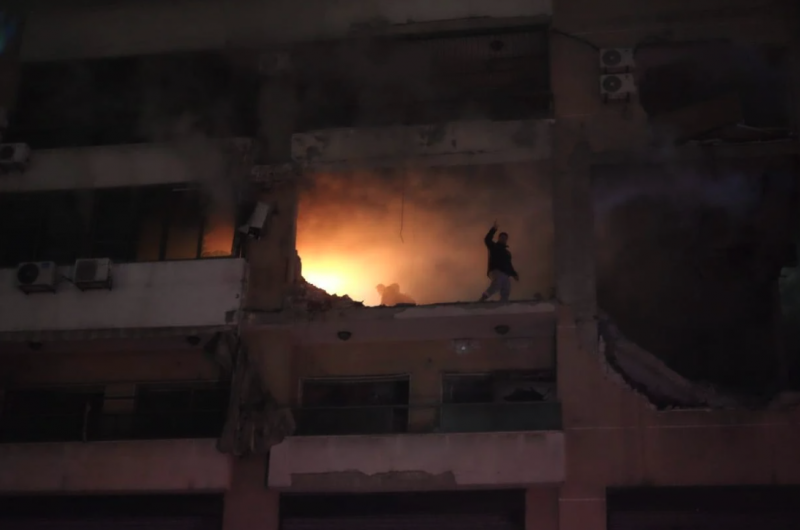
In Beirut's southern suburb on Jan 2, 2024. (Credit: Joao Sousa/ L'Orient Today)
Hezbollah Secretary General Hassan Nasrallah is expected to deliver a speech at 6 p.m. on Wednesday, marking the third anniversary of the assassination of Iranian commander Qassim Soleimani, who was killed in a US drone strike in Iraq on Jan. 3, 2020.
This would be Nasrallah’s third address since Hamas’ Oct. 7 attack, and given the recent developments, the most anticipated.
Hezbollah has clearly demonstrated in recent months that it does not wish to enter into a full-scale war with Israel, regardless of developments in Gaza.
But the killing of Saleh al-Arouri, Hamas’ number two man, by an Israeli surgical strike in Beirut’s southern suburb on Tuesday evening, constitutes a major development.
This is the first time since Oct. 8 that Hezbollah finds itself in such a precarious situation. For the first time since the outbreak of hostilities, the risk of an uncontrollable escalation in southern Lebanon appears to be high.
Saleh al-Arouri is the most senior Hamas commander killed since the Oct. 7 attack.
Co-founder of al-Qassam Brigades, Hamas’ armed wing, Arouri was one of Israel’s priority targets.
Based in Lebanon for several years, Arouri is said to have contributed greatly to the rapprochement between Hamas and Hezbollah, stressing the “unity of fronts” approach, which implies close coordination between the members of the “axis of resistance” in their fight against Israel.
Beyond his profile, the location of Arouri’s assassination renders it an “exceptional” event in the current sequence.
By eliminating the main leader of Hamas in Lebanon within the very stronghold of Hezbollah, Israel has significantly escalated the situation.
The decision to target someone as crucial as Arouri had to be carefully weighed against the potential retaliation it might provoke from Hezbollah.
Possibly, Israel is confident that Hezbollah is incapable of responding to this attack, thereby weakening its position both internally and regionally.
Alternatively, Israel might be intentionally provoking an escalation, aiming to prompt a second front in southern Lebanon — an outcome that the United States has actively sought to prevent since Oct. 7.
The precarious current situation
Israel has been considering a larger-scale operation in Lebanon for weeks, aiming to establish a “security zone” south of the Litani River. However, this plan poses significant risks for Israel, given Hezbollah’s formidable capabilities and Washington’s reluctance to support such a military venture.
The pertinent question is: Does the assassination of Arouri indicate Israel’s readiness to take action in Lebanon? Not necessarily.
However, it does underscore Israel’s willingness to undertake substantial risks to attain its objectives.
The Israelis are probing Hezbollah’s red lines.
Hezbollah, exercising caution since Oct. 8, is unlikely to initiate an all-out war against Israel solely in response to the death of a Palestinian commander, no matter how senior they may have been.
As a reminder, the “axis of resistance” did not strongly retaliate to the assassinations of figures like Imad Mughniyeh [a senior Hezbollah military commander], Qassim Soleimani, or more recently, Razi Mousavi, [a leader within the Iranian Islamic Revolutionary Guard Corps (IRGC)’s Quds Force].
The decision to engage in war hinges on broader and more strategic considerations.
The peculiarity of the current situation, however, is that Arouri was not killed in Syria or in South Lebanon, but in the southern suburbs of Beirut.
Israel has sent two messages with this operation.
The first is that no one is safe, including in Hezbollah’s stronghold. The second is that its priority target remains Hamas and that Hezbollah is secondary to it in this equation.
Can Hezbollah refrain from responding to an Israeli attack of this magnitude, which clearly surpasses the so-called rules of engagement, within its stronghold?
Once again, this appears unlikely.
Hezbollah appears compelled to respond to assert its red lines, albeit with the intention of containing the risk of escalation.
Navigating this middle ground is exceptionally challenging.
If Hezbollah refrains from action, it could encourage more attacks of this nature within its stronghold. On the other hand, if its response is excessively forceful, it may escalate into an all-out war.
Nasrallah is scheduled to give two speeches this week, and they are anticipated to be precarious undertakings, to say the least.
This article was originally published in L'Orient-Le Jour. Translated by Sahar Ghoussoub.
- Even if Netanyahu wanted de-escalation with Lebanon, a law could make it difficult: Media report
- To background of bombs, Palestinians flee Rafah to seek shelter elsewhere once again
- Hamas accepts Qatar-Egypt cease-fire proposal, Israeli official describes move as 'ruse': Day 213 of the Gaza war